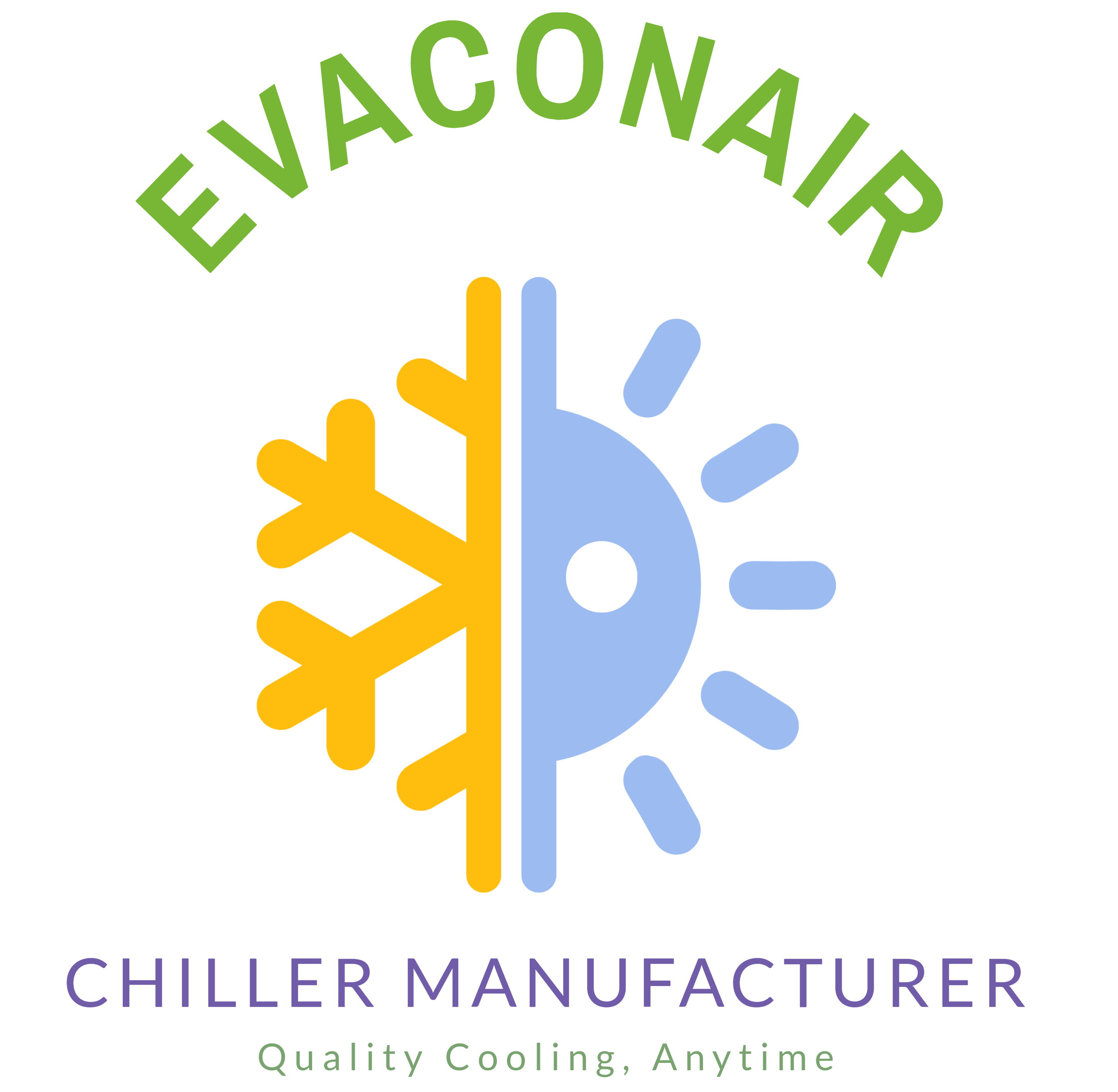Blog
Which is Better: Screw Chiller or Reciprocating Chiller?
When choosing between a screw chiller and a reciprocating chiller, it’s essential to consider your specific cooling requirements, including capacity, efficiency, and long-term operational costs. Both chiller types have their advantages, but the right choice depends on factors such as the load profile, maintenance needs, and energy efficiency.
Screw Chiller
A screw chiller uses two interlocking helical rotors to compress refrigerant, providing smooth and continuous cooling. These chillers are known for their efficiency and reliability, especially in medium to large capacity applications.
Advantages of Screw Chillers:
- Higher Energy Efficiency:
- Screw chillers are highly efficient, especially at partial loads, making them ideal for applications where cooling demand varies throughout the day. Systems like the Air-Cooled Screw Chiller in Ahmedabad and Water Cooled Screw Chiller in Ahmedabad offer excellent performance in industrial and commercial applications.
- Lower Maintenance:
- Screw compressors have fewer moving parts compared to reciprocating compressors, which means less wear and tear, leading to lower maintenance costs over time. This makes them an attractive choice for businesses working with Chiller Manufacturers in Ahmedabad who need reliable cooling solutions with minimal maintenance.
- Smooth and Continuous Operation:
- The screw compressor provides smooth and continuous operation, which helps in reducing noise and vibrations. This feature makes screw chillers a good fit for industries that require constant, reliable cooling.
- Longer Lifespan:
- Screw chillers are known for their durability and longevity, making them suitable for long-term use in industries that rely on efficient, uninterrupted cooling.
Disadvantages of Screw Chillers:
- Higher Initial Cost:
- Screw chillers are typically more expensive upfront than reciprocating chillers. However, their higher efficiency and lower maintenance costs often offset the initial investment over time.
Reciprocating Chiller
A reciprocating chiller uses a piston-and-cylinder mechanism to compress refrigerant. These chillers are more suited for smaller cooling capacities and are often used in applications with lower cooling demands.
Advantages of Reciprocating Chillers:
- Lower Initial Cost:
- Reciprocating chillers have a lower initial cost compared to screw chillers, making them a more affordable option for businesses with smaller budgets.
- Compact Design:
- Reciprocating chillers tend to be smaller in size and are easier to install in confined spaces, making them a good choice for smaller commercial and industrial setups that don’t require large cooling capacities.
Disadvantages of Reciprocating Chillers:
- Lower Efficiency:
- Reciprocating chillers are less efficient than screw chillers, particularly at partial loads. This can result in higher energy consumption and operational costs over time, making them less suitable for industries looking for energy savings with Water Cooled Water Chillers in Ahmedabad.
- Higher Maintenance:
- Reciprocating compressors have more moving parts, which means they experience more wear and tear over time. This results in higher maintenance requirements compared to screw chillers. Businesses working with Chiller Dealers in Ahmedabad often prefer screw chillers for this reason.
- Noisier Operation:
- Reciprocating chillers tend to produce more noise and vibrations during operation due to the piston mechanism, which may not be ideal for environments where noise needs to be minimized.
Comparison: Screw Chiller vs. Reciprocating Chiller
| Criteria | Screw Chiller | Reciprocating Chiller |
|---|---|---|
| Efficiency | Higher efficiency, especially at partial loads | Lower efficiency, especially at variable loads |
| Initial Cost | Higher upfront cost | Lower initial cost |
| Maintenance | Lower maintenance due to fewer moving parts | Higher maintenance due to more wear and tear |
| Noise and Vibration | Quiet and smooth operation | Noisier and higher vibration |
| Ideal Capacity | Medium to large applications (100-500+ tons) | Smaller applications (below 100 tons) |
| Lifespan | Longer lifespan with fewer breakdowns | Shorter lifespan, more frequent repairs |
Which is Better for Your Needs?
Screw Chillers:
- Best for medium to large cooling capacities where energy efficiency is a priority.
- Suitable for industries and large commercial applications such as Air-Cooled Water Chillers or Water Cooled Screw Chillers, where consistent, smooth operation is critical.
- Ideal for businesses looking for long-term operational savings through reduced maintenance and energy costs.
Reciprocating Chillers:
- Best for smaller applications with lower cooling capacity requirements.
- Suitable for businesses with a limited budget that need a more affordable cooling solution, even if it means higher operational costs in the long run.
- A good option for confined spaces that do not require high-capacity cooling.
Conclusion
Choosing between a screw chiller and a reciprocating chiller depends on your specific cooling needs. Screw chillers are more efficient, durable, and quieter, making them the preferred option for medium to large applications such as Air Cooled Screw Chillers in Ahmedabad or Water Cooled Water Chillers in Ahmedabad. On the other hand, reciprocating chillers offer a more affordable initial cost but come with higher operational costs and maintenance needs. For more detailed guidance on selecting the right chiller system for your business, visit our products page.
